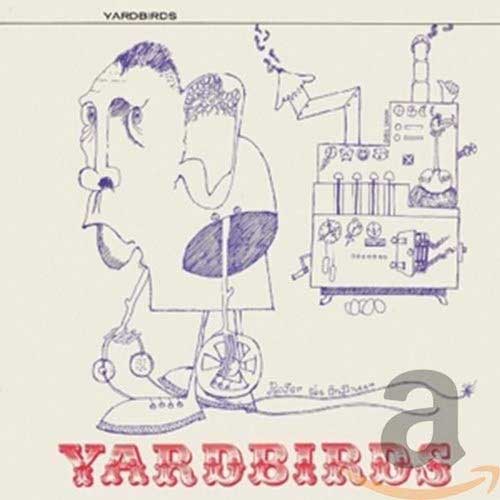You can trust Louder

Lost Woman
Over Under Sideways Down
The Nazz Are Blue
I Can't Make Your Way
Rack My Mind
Farewell
Hot House of Omagararshid
Jeff's Boogie
He's Always There
Turn into Earth
What Do You Want
Ever Since the World Began
Arguably best known as a finishing school for three of Britrock’s most celebrated guitarists – Eric Clapton, Jeff Beck and Jimmy Page – The Yardbirds are a band whose recorded output is rarely held in the same regard as contemporaries such as the Rolling Stones and The Beatles, both of whom made significant strides of their own in 1966.
Listening to The Yardbirds’ sole UK LP (aka Roger The Engineer) it’s easy to see why. With one foot in their blues past and the other in the psychedelic present, this is an erratic album that’s held together by Beck’s frequently dazzling displays.
It combines every element of The Yardbirds at their best, from the self-explanatory instrumental Jeff’s Boogie (in which Beck manages to pay tribute to both sea shanties and Cilla Black’s Alfie) to the brilliant Elmore James ‘close tribute’ The Nazz Are Blue; from the blues workout of Rack My Mind to the drone pop of Turn To Earth; and from the full-on, year-early psychedelia of Over, Under, Sideways, Down to the droll Hot House Of Omagarashid, which apparently samples someone taking the piss out of the band’s long hair.
Throughout there’s a sense of fun, space and experimentation.

Every week, Album of the Week Club listens to and discusses the album in question, votes on how good it is, and publishes our findings, with the aim of giving people reliable reviews and the wider rock community the chance to contribute.
Sign up below to get the latest from Classic Rock, plus exclusive special offers, direct to your inbox!

Other albums released in July 1966
- Animalization - The Animals
- Fifth Dimension - The Byrds
- Blues Breakers with Eric Clapton - John Mayall & the Bluesbreakers
- From Nowhere - The Troggs
- And Then... Along Comes the Association - The Association
- Beau Brummels '66 - The Beau Brummels
- Tim Hardin 1 - Tim Hardin

What they said...
"Despite a handful of brilliant moments, Roger the Engineer falls short of expectations, partially because the band is reluctant to leave their blues roots behind and partially because they simply can't write a consistent set of songs. At their best on Roger, the Yardbirds strike a kinetic balance of blues-rock form and explosive psychedelia, but they can also bog down in silly Eastern drones or blues tradition." (AllMusic)
"On Roger…the band approached something like the only proper studio album of this classic mid-period line-up. While Keith Relf’s rather anaemic blues yelps were never going to make them the rivals to the Stones or Beatles, the well-oiled rhythm section were perfectly suited to support some of Beck’s wildest sounds to date." (BBC)
"What is fascinating about the album is it is a chronicle of a band at the end of their run trying to find a new path and failing to do so. They couldn’t make the transition from Swinging London to Haight-Ashbury, and they couldn’t make the two-great-lead-guitar-heroes model work. Jeff Beck would leave the band to Jimmy Page shortly thereafter, and Paul Samwell-Smith would depart to launch a successful career as a producer." (AltRockChick)

What you said...
Gary Claydon: The fact that this album is known by three different titles (Yardbirds, the more popular Roger The Engineer and Over Under Sideways Down for the States) kinda fits in with the uneven nature, not only of the album itself but of The Yardbirds' career in general. The songwriting varied in quality and consistency. You could make a fair argument that their strongest work was to be found in their singles output, which often seemed to be the main focus for their record label - along with a determined push to 'break' America. This was reflected by a touring schedule which was punishing even for a band as at home in the live environment as The Yardbirds.
With the departure of blues purist Clapton, the band were at something of a crossroads. They and their management were unsure whether to stick to the tried and trusted formula, pursue a 'poppier' direction, or to dip a toe into the nascent psychedelic scene. In the end Roger The Engineer did all three, without actually veering far from their R&B roots.
First thing to note is that the song's on Roger The Engineer are all original compositions. This wasn't the norm among mid-60s blues bands, and you'd usually expect one or more takes on old blues standards. The main influences are easily detectable though. The Nazz Are Blue ( complete with rare Jeff Beck vocal) is a lift of Dust My Broom, for instance, but elsewhere you can clearly hear the sound of the swinging '60s, proto-hard rock in among the electric blues and, of course, hints of psychedelia.
The ace up the sleeve here is, of course, Jeff Beck. Only 21 when he joined The Yardbirds, Beck was a state-of-the-art guitar hero (at least, until Hendrix moved the goal posts) and was the perfect fit for a band looking to experiment. Beck has never been one to rest on his laurels, always seeking to push the boundaries, illustrated on Roger The Engineer by the fact that he seems to find a different guitar tone for just about every track. Yet Beck doesn't totally dominate, he leaves the rest of the band plenty of room for manoeuvre.
Roger The Engineer serves as very listenable document to the shifting sands of 60s music and any album featuring Jeff Beck will always be worth a visit.
Mike Canoe: Roger The Engineer was released in 1966 which, by my calculations, makes it the oldest album ever chosen as a club pick. Put another way, it is older than the Beatles' Sgt. Pepper's Hearts Club Band, an album that is considered by some as the beginning of classic rock. As such, I was worried Roger the Engineer would be too old to sound like classic rock.
I needn't have worried. Echoes of the Yardbirds are still heard in Britpop, the Swedish garage rock revival, alternative rock from wherever. Even the cover art has that fine indie feel.
Roger The Engineer is another fun one. For the purpose of this review, I focused on the UK version's track listing. Cool sounds abound, voices harmonise like angels with dirty faces, and the lyrics are peppered with humour.
As with former club pick Truth, Jeff Beck's playing is impressive but I'm just as impressed by his ability to show restraint and let the whole band shine. The Yardbirds are best known for the guitarists who left for something bigger and better, but Roger The Engineer shows them as a talented band in their own right.
Chris Elliott: It's dated. Very dated. By 1966 it's not even original or ground breaking for its time.
Alex Hayes: Like other members of the Club, the revelation that Roger The Engineer (1966) was the only Yardbirds studio album officially released here in the UK came as a bit of a surprise to me. I could have sworn blind that an old acquaintance of mine from back in the day owned a copy of Little Games, and played it for me a few times. I could be mistaken obviously, or I guess the album could have been on import or something . Not that it really matters.
I bloody love those early years of what we nowadays classify as 'classic rock', so Roger The Engineer was always gonna be a winner in my book. To rank it as one of the best albums of that era would be a bit of an exaggeration (Revolver and Aftermath, both from that same year, are far superior for example). However, this was an enjoyable listen, and I think I'll pick up a physical copy in the near future.
Roger The Engineer has two particular artistic plus points going in its favour. Firstly, there's its largely successful fusion of blues and early psychedelic rock, two musical styles that were starting to flourish in the British pop/rock scene at that time. This kind of balancing act may have reached its pinnacle a year later, on Cream's seminal Disraeli Gears, but the Yardbirds deserve a lot of credit for bringing such ambitious music to life, during what was still a very green and fertile period in rock music's development.
The second most potent weapon in Roger The Engineer's arsenal is the effortlessly top notch guitar work from Jeff Beck, whose contributions here shine, especially when the age of the album is brought into context. Without Beck's input, certain parts of this record would likely have never risen above mediocrity. For someone listening to this music in 1966, Beck's guitar mastery must have seemed like it had arrived from another planet. We even get a rare lead vocal from Beck here, on The Nazz Are Blue.
I've also just found the time to reacquaint myself with Little Games. Yep, I've definitely heard it before. It's of particular interest to me as a big Led Zeppelin fan, through the switch in lead guitarist from Beck to Jimmy Page. Little Games isn't a highly rated album, but it works well enough for me. It's worth checking out for the early prototype of White Summer alone. Between them, Roger The Engineer and Little Games provide strong evidence to cement the Yardbirds' enduring reputation as a pioneering and influential group for their time.
They simply had to split up when they did though. Had they not, a certain other group would never have come into being. Shudder. Now, that doesn't bear thinking about.
Bill Griffin: A lot of this sounds dated to my ear (and it is) but if one allows for that, it's a pretty good album. I am rather stunned that it is the only UK release for the band. I guess that is due to the guitarists not having yet established their reputations.
Greg Schwepe: My first exposure to The Yardbirds was on Eric Clapton and Jeff Beck box sets. The first CD in both sets focuses on both guitarists tenure in the Yardbirds. And while I’m a fan of both guitarists, I really liked the Beck-era stuff better. So, I’m glad a Beck-era album was selected to be reviewed.
First off, this album sounds dated… and that’s why I like it. You hear some of that kinda weird psychedelic stuff and it just transports me back to mid to late sixties London. Well, I envision pictures of bands and the clubs back then that I’ve seen on music documentaries.
And as far as the psychedelic turn from the Clapton-era stuff… did the band simply change their writing style and adapt, or was it the addition of Beck’s fuzzed out Telecaster? “Oh, this new guy can totally play some cool new stuff, maaaaan!”
I focused on the stereo tracks and Lost Women comes out of the gate with a great bass line. And then we get to Over Under Sideways Down and that Beck guitar tone.
The Nazz Are Blue brings us back to that straight 4/4 bluesy vibe with more foreshadowing of Beck’s emerging style. Hot House of Omagararshid” with its trippy bubbling background sound effects, riffing guitar and “yah, yah, yah” vocals shows the band’s experimentation in full force.
And after that we have Jeff’s Boogie with more guitar pyrotechnics. Sweet! Overall, for me this represents the era of the Yardbirds that I liked the best. Swingin’ 60’s, yeah baby!
John Davidson: This album is the full experience of 60s blues infused guitar pop. Great melodies, vocal harmonies and some fantastic guitar and bass/ drum work.
I've never understood the reverence for beck, but you get glimpses here of his talent as he adds flourish to the song writing of Samwell-Smith and Relf.
It sounds very 60s for sure, but it still holds the interest today even without the easy familiarity of similar songs by the Kinks, the Who and the Rolling Stones .

Final score: 7.51 (41 votes cast, total score 308)
Join the Album Of The Week Club on Facebook to join in. The history of rock, one album at a time.
Classic Rock is the online home of the world's best rock'n'roll magazine. We bring you breaking news, exclusive interviews and behind-the-scenes features, as well as unrivalled access to the biggest names in rock music; from Led Zeppelin to Deep Purple, Guns N’ Roses to the Rolling Stones, AC/DC to the Sex Pistols, and everything in between. Our expert writers bring you the very best on established and emerging bands plus everything you need to know about the mightiest new music releases.


